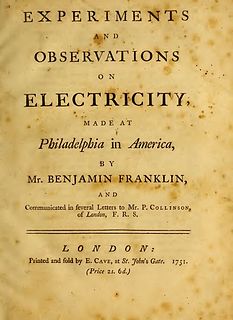 W
WThe Autobiography of Benjamin Franklin is the traditional name for the unfinished record of his own life written by Benjamin Franklin from 1771 to 1790; however, Franklin himself appears to have called the work his Memoirs. Although it had a tortuous publication history after Franklin's death, this work has become one of the most famous and influential examples of an autobiography ever written.
 W
WBenjamin Franklin was responsible for writing satirical comedies. His most notable humorous work is the collection called The Bagatelles.
 W
WMrs. Silence Dogood was the pen name used by Benjamin Franklin to get his work published in the New-England Courant, a newspaper founded and published by his brother James Franklin. This was after Benjamin Franklin was denied several times when he tried to publish letters under his own name in the Courant. The 14 Mrs. Silence Dogood letters were first printed in 1722.
 W
WExperiments and Observations on Electricity is a mid-eighteenth century book consisting of letters from Benjamin Franklin. These letters concerned Franklin's discoveries about the behavior of electricity based on experimentation and scientific studies. The book came in pamphlet form for the first three English editions. The last two editions were in a book volume with hard covers and a book spine. There were eleven European editions of the book: five English editions, three French editions, and a German, Italian and Latin edition. The publication was well received worldwide. It was considered America's most important scientific book of the eighteenth century.
 W
W"Fart Proudly" is the popular name of an essay about flatulence written by Benjamin Franklin c. 1781 while he was living abroad as United States Ambassador to France. It is an example of flatulence humor.
 W
WJoin, or Die. is a political cartoon attributed to Benjamin Franklin. The original publication by the Pennsylvania Gazette on May 9, 1754, is the earliest known pictorial representation of colonial union produced by an American colonist in Colonial America. It is a woodcut showing a snake cut into eighths, with each segment labeled with the initials of one of the American colonies or regions. New England was represented as one segment, rather than the four colonies it was at that time. Delaware was not listed separately as it was part of Pennsylvania. Georgia, however, was omitted completely. Thus, it has eight segments of a snake rather than the traditional 13 colonies. The poster focused solely on the colonies that claimed shared identities as Americans. The cartoon appeared along with Franklin's editorial about the "disunited state" of the colonies and helped make his point about the importance of colonial unity. It later became a symbol of colonial freedom during the American Revolutionary War.
 W
WPoor Richard's Almanack was a yearly almanac published by Benjamin Franklin, who adopted the pseudonym of "Poor Richard" or "Richard Saunders" for this purpose. The publication appeared continually from 1732 to 1758. It sold exceptionally well for a pamphlet published in the Thirteen Colonies; print runs reached 10,000 per year.
 W
W"The Speech of Polly Baker" (1747) is the fictional story of a woman put on trial in 1747 for having an illegitimate child. She had been convicted five times in the past for this same crime. Each time, she said, the full blame was placed on her shoulders but not the father's. In later versions, the story ends as she is set free and marries one of the magistrates in charge of her trial.
 W
WThe Busy-Body was a pen name used by Benjamin Franklin and Joseph Breintnall in a column printed in The American Weekly Mercury, an early American newspaper founded and published by Andrew Bradford. There are 32 letters in "The Busy-Body" series. The essays were printed in 1729.
 W
WThe Way to Wealth is an essay written by Benjamin Franklin in 1758. It is a collection of adages and advice presented in Poor Richard's Almanac during its first 25 years of publication, organized into a speech given by "Father Abraham" to a group of people. Many of the phrases Father Abraham quotes continue to be familiar today. The essay's advice is based on the themes of work ethic and frugality.